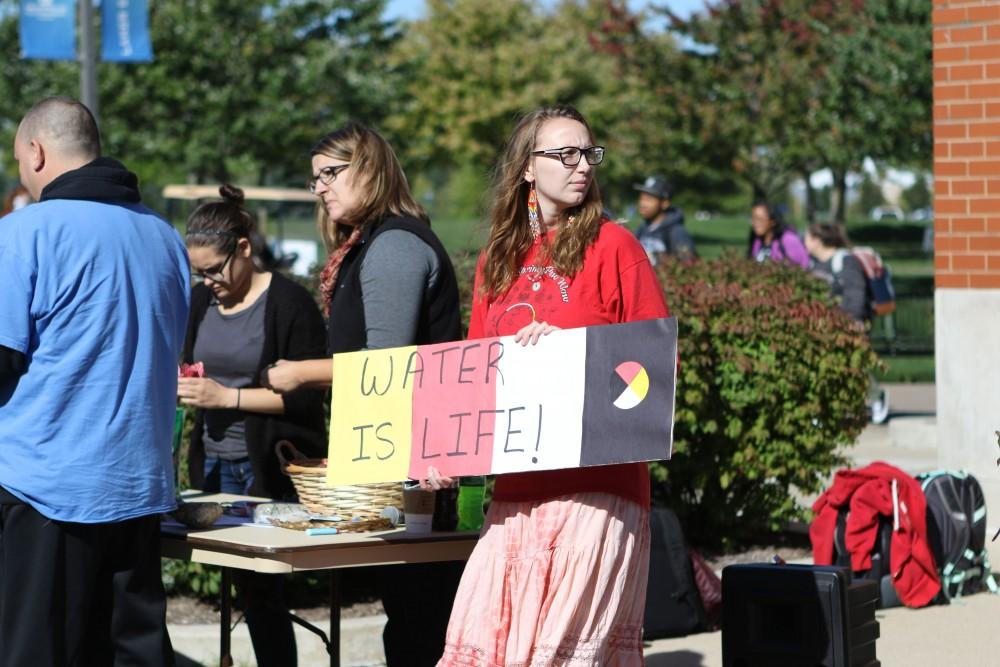Native American Student Association holds rally about Dakota Access Pipeline

GVL / Luke Holmes – The “Water is Life” awareness rally was held right next to the clock tower on Monday, Oct. 10, 2016.
Oct 13, 2016
In an effort to educate the Grand Valley State University community about the Dakota Access Pipeline (DAPL) and its potential ramifications, the GVSU Native American Student Association (NASA) held an awareness rally in the Cook-DeWitt Plaza Monday, Oct. 10.
NASA members and representatives from other student organizations took turns using a microphone to speak to attendees and passersby about the universal need for water in an attempt to relate DAPL concerns to the broader GVSU community.
“With no water, there is no life,” said Joe Cadreau, a NASA member. “All I’m trying to do is raise awareness about this issue.”
Rally participants voiced their support for the Standing Rock Sioux Tribe, which has been protesting the DAPL construction and has filed a federal complaint over the issue. The tribe cited potential environmental consequences and destruction of significant and sacred sites as reasons to halt the project. DAPL proponents, on the other hand, maintain the pipeline, designed to transport crude oil across four states, will have a significant and positive economic impact.
“(We held the rally) to support the tribe that’s out there trying to stop what’s going on,” said Ashley Jacobs, a NASA member. “(They) need people like us in other tribes to back them up.”
Linking the DAPL concerns to other water-related issues, rally speakers argued minorities in particular are disproportionately affected by water problems.
“These occurrences are either happening (in) urban areas or on tribal land, so those are predominately the areas where minorities live and go to school,” said Cheyanna Green-Molett, vice president of GVSU’S NAACP chapter. “Dakota pipelines has the potential to be the Flint water crisis. We don’t want the pipelines due to the fact that they could burst, they could affect the water system in Dakota. If we prevent them from even putting them in, that’s preventing possible contamination of the water.”
Green-Molett also voiced her concern that non-minority students might be unaware of many issues such as this one facing minorities. She said since the GVSU population is predominately white, individual GVSU community members might not know or understand the issues minority students face.
“Most of their friends are not people of color, so (if) we are out here and we are showing them what the problems are, they can see it from our point of view as well,” she said. “We’re just exposing them to everyday culture that we have to deal with, (disparities) that we have to deal with, everyday things that we have to think about as minorities in this community.”
Melissa Knox, a GVSU Intersections ambassador, participated in the rally to express her solidarity with affected parties and learn more about the DAPL issue.
“I think as a white person, it’s really important to lend my solidarity and it’s my role to be educated and to actively pursue that education,” Knox said. “So I’m here to learn; I’m here to lend my voice however I can and to just provide my support in any way.”
Several rally participants expressed their hope that people who stopped by and got more information about DAPL would share what they learned with others in order to spread awareness.
“We’re just trying to get other people to know,” Jacobs said. “We’re just trying to inform people.”






















